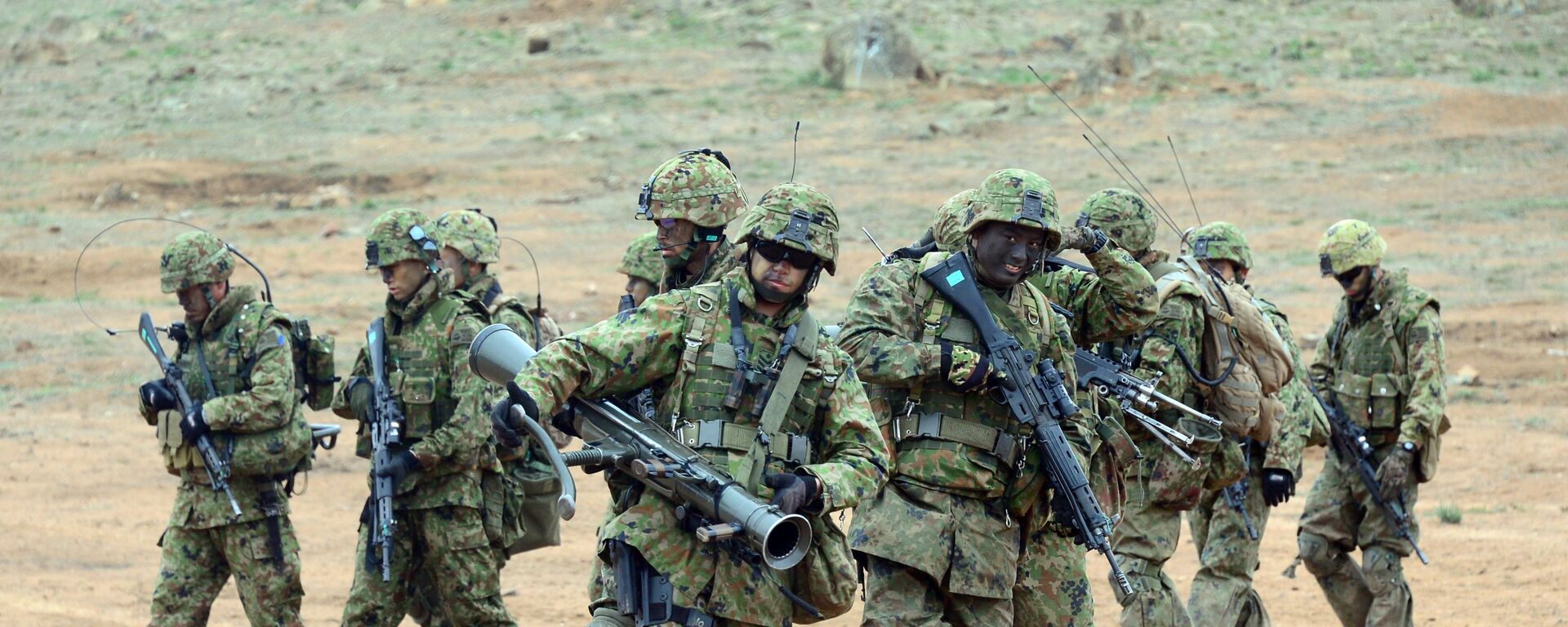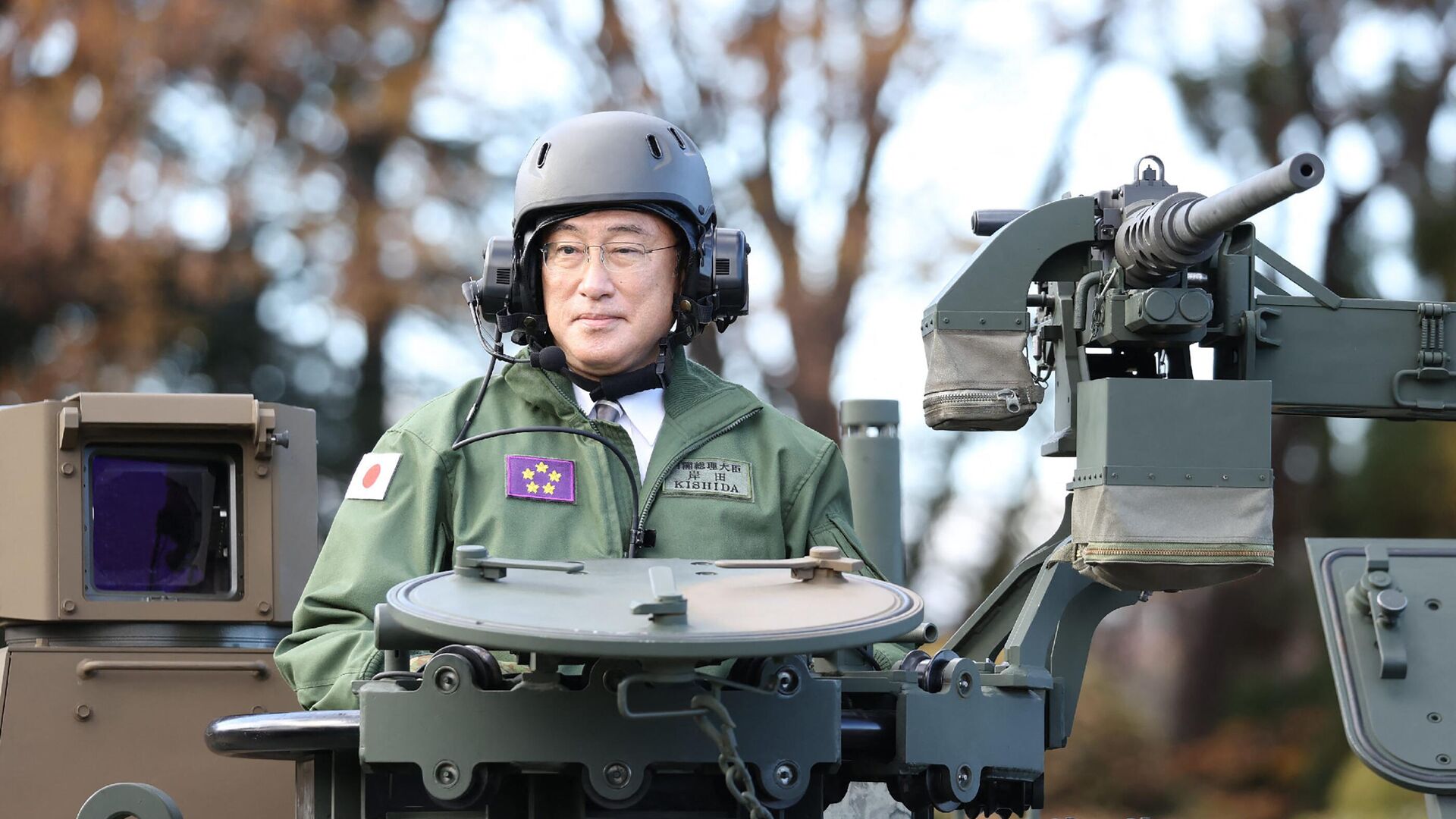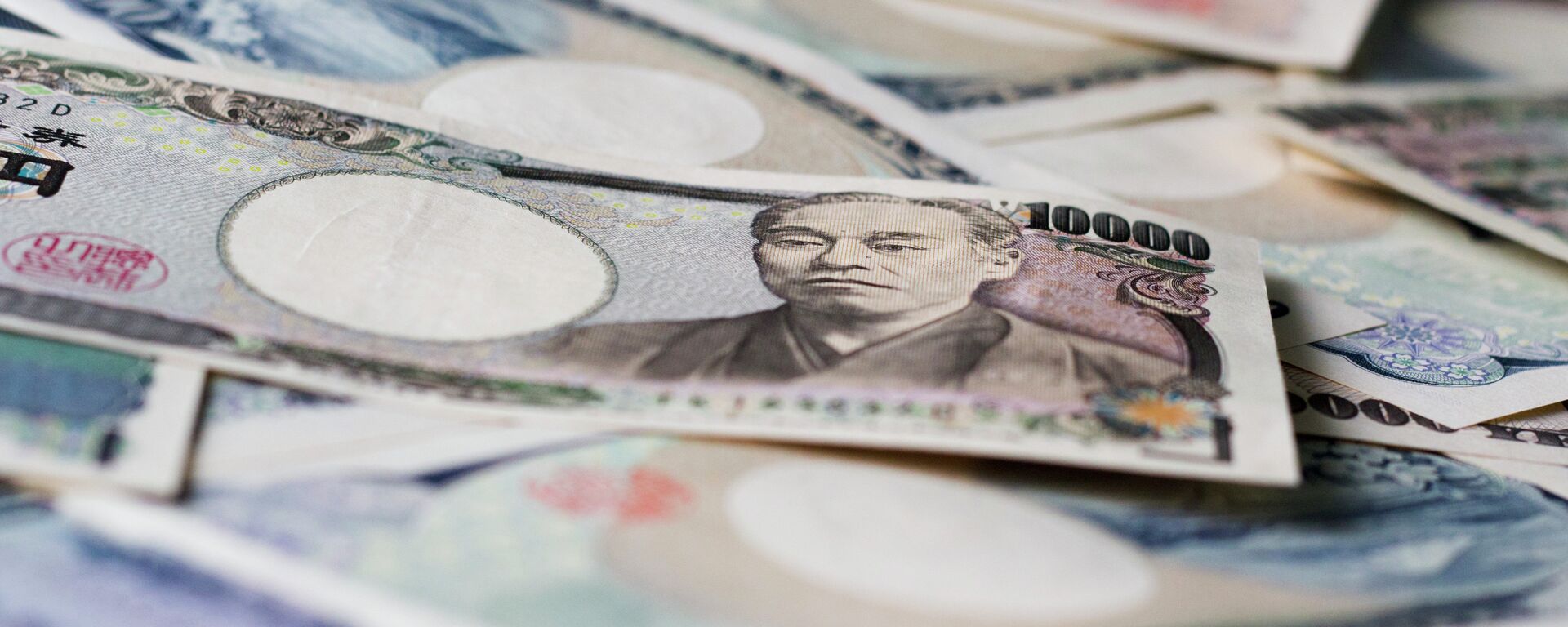https://sputnikglobe.com/20231106/japan-may-sacrifice-own-defense-industry-to-continue-buying-us-weapons-as-yen-plummets-1114751212.html
Japan May ‘Sacrifice’ Own Defense Industry to Continue Buying US Weapons as Yen Plummets
Japan May ‘Sacrifice’ Own Defense Industry to Continue Buying US Weapons as Yen Plummets
Sputnik International
While Tokyo's hopes of becoming potentially the world's third-biggest military spender may have been sapped by the collapse of the yen, “there is no talk of abandoning plans yet,” Oleg Paramonov told Sputnik.
2023-11-06T11:12+0000
2023-11-06T11:12+0000
2023-11-06T11:37+0000
analysis
japan
economy
yen
bank of japan
fumio kishida
militarization
https://cdn1.img.sputnikglobe.com/img/07e7/0b/06/1114751020_0:145:2801:1720_1920x0_80_0_0_3a2fa0f44fda909dbbdb167efb62e357.jpg
Japan appears to have been forced to scale back its ambitious military spending plans that envisaged a historic five-year defense upgrade worth 43.5 trillion yen, Oleg Paramonov, Senior Researcher Fellow at the Center for Studies of Eastern Asia and the SCO of the Institute for International Studies of MGIMO, told Sputnik.Although Tokyo's hopes of becoming the world's third-biggest military spender may have been sapped by the collapse of the yen, “there is no talk of abandoning plans yet,” said the pundit. “This is especially the case when it comes to buying, for example, F-35 fighters. We are talking about an adjustment of the plans. As for the problems with the weak Japanese yen, it is rooted in a number of factors related to the easy monetary policy settings of the Japanese Central Bank, the tough policy of the American Federal Reserve System, and rising fuel prices. It should be clarified that, in principle, the Japanese economy is trying to remain export-oriented – something that has been its visiting card throughout the post-war period. There have been problems with this of late, and Tokyo is trying to regain this status,” Paramonov said.A depreciation of Japan’s currency – the yen – forced Tokyo to review and shrink its massive military spending plan, Reuters has already reported citing Japanese government sources. When Japan's Defense Ministry requested its largest defense budget for fiscal year 2024 worth a whopping $53Bln, 12 percent higher than in 2023, the defense procurement plan was then-calculated to cost $320Bln, the sources said. At the time of the purchase plan’s formulation, Tokyo had reportedly presumed that its domestic currency would enjoy an exchange rate of 108 yen to the dollar. That was, in fact, the rate at which the yen had last traded in summer of 2021. However, by early November, the yen had slumped to 151 to the dollar which is approximately what the present rate is. It was this that purportedly prompted Japan to begin paring back military procurement.Now, however, both government and industry sources told Reuters that Japan would be cutting back on aircraft purchases in 2024. Generally, a weak yen meant that the cost of everything had soared, from Tomahawk cruise missiles to F-35 stealth fighters, the report added. Nevertheless, Japan would reportedly prioritize spending on advanced US-made missiles, with less money allocated towards "Japanese-made support aircraft and other secondary kit," it was noted.It should also be noted that the yen has been in steady decline because of the Japanese Central Bank's commitment to monetary easing policy. The depreciation is largely attributed to differences between the Japanese and US central banks' monetary policies. Where the US Federal Reserve increases its benchmark interest rate, the Bank of Japan keeps it negative. Even after the Bank of Japan took a step towards easing limits on yields on 10-year government debt, stating on 31 October that the 1 percent level would be a reference point, the yen fell 1.7 percent against the dollar. Furthermore, Japan’s central bank maintained its policy rate at minus-0.1 percent.Impact of Weak Yen“A weak yen is in the interests of Japanese businesses, especially export-oriented industries, but for the Japanese security sector, in general, a number of serious challenges arise here" Paramonov emphasized.“The country is trying to match its defense capabilities to its economic potential. New national security documents suggest a significant increase in defense spending. At the same time, the government intended to solve two important problems: the first to boost Japan's defense capabilities. We can already talk about ‘military power’, although the formally pacifist article of the Constitution is still in force. Therefore, we are rather talking about defense capability, including the emergence in Japan of so-called means for striking a potential enemy’s targets of strategic importance. For example, command posts, missile launchers, and so on,” the expert explained.The intent was to solve this task primarily through the purchase of American-made weapons, including Tomahawk missiles, Paramonov clarified, adding that this was where the situation with the yen had a serious impact on the implementation of the plans. He continued:'Sacrificing Interests of National Defense Industry'Another matter specifically discussed in the new program documents was support for the national defense industry, which has been in a state of stagnation in Japan for quite a long time, recalled the pundit, adding that for quite a long time, until the mid-2010s, Japan had restrictions on the export of military products. The Japanese defense industry had been caught between a rock and a hard place, facing low purchase volumes from the Ministry of Defense itself, and the inability to reach foreign markets. Accordingly, many companies began to leave this sector, said the expert. As Japan has no military-industrial complex in the classical sense of the word, as a rule, military production is taken on by divisions of large companies and concerns, such as Mitsubishi, Kawasaki, Subaru, etc. It had become no longer profitable for Japanese business to engage in military production.Accordingly, one of the goals of boosting defense spending was to promote the national defense industry by expanding purchases of products made by Japanese companies for its domestic forces. However, by all accounts, "this is exactly what the Japanese will have to economize on now," Paramonov insisted.Paramonov said he believed that “Japan will be forced to sacrifice the interests of the national defense industry in favor of purchasing American-made weapons, in particular, F 35 fighters and Tomahawk missiles." Accordingly, the Japanese defense industry, "which had hoped to be a beneficiary of the beefed-up defense funding, is likely to face serious disappointment here," Paramonov surmised.Bearing in mind the unfolding situation, Washington has a vested interest in Japan continuing to purchase its weapons, and remaining committed to the path of endowing its self-defense forces with offensive capabilities, Paramonov underscored. The important thing for Washington is that Tokyo does not abandon plans to give its self-defense forces offensive capabilities by cooperating with the United States in the field of missile defense, he added. This presupposes the acquisition of American Tomahawk missiles. Initially, Japan planned to buy 400 of the latest 'Block 5' missiles. Now, because of financial difficulties, the Japanese are planning first to purchase a batch of 200 'Block 4' missiles, developed in the Eighties, and then another 200 'Block 5' missiles. But the acquisitions will be moved up from 2026 to 2025.There is one aspect remaining - the approval of the US Congress is needed to change the timing of when American Tomahawk missiles are delivered to Japan, Paramonov said, adding that all of these developments fit into the American strategy of unprecedented military build-up in the Asia-Pacific region under the pretext of a perceived "threat" from its neighbors.The expert summed up:
https://sputnikglobe.com/20230628/japanese-govt-vows-to-monitor-currency-fluctuation-after-yen-hits-7-month-low-1111518257.html
https://sputnikglobe.com/20230905/japans-pursuit-of-boosting-military-spending-aims-to-shape-country-into-us-proxy-1113127841.html
japan
Sputnik International
feedback@sputniknews.com
+74956456601
MIA „Rosiya Segodnya“
2023
News
en_EN
Sputnik International
feedback@sputniknews.com
+74956456601
MIA „Rosiya Segodnya“
Sputnik International
feedback@sputniknews.com
+74956456601
MIA „Rosiya Segodnya“
japan's defense spending, prime minister fumio kishida, japan's military build-up, collapse of the yen, depreciation of the japan’s currency
japan's defense spending, prime minister fumio kishida, japan's military build-up, collapse of the yen, depreciation of the japan’s currency
Japan May ‘Sacrifice’ Own Defense Industry to Continue Buying US Weapons as Yen Plummets
11:12 GMT 06.11.2023 (Updated: 11:37 GMT 06.11.2023) Japan’s Prime Minister Fumio Kishida has been on a military spending spree, with the massive defense build-up and procurement rationalized by US-driven claims of alleged threats from neighboring countries. However, the economy appears to have put a spanner in the wheel of that ambitious expansion.
Japan appears to have been forced to scale back its
ambitious military spending plans that envisaged a historic five-year defense upgrade worth
43.5 trillion yen,
Oleg Paramonov, Senior Researcher Fellow at the Center for Studies of Eastern Asia and the SCO of the Institute for International Studies of MGIMO, told Sputnik.
Although Tokyo's hopes of becoming the world's third-biggest military spender may have been sapped by the collapse of the yen, “there is no talk of abandoning plans yet,” said the pundit.
“This is especially the case when it comes to buying, for example, F-35 fighters. We are talking about an adjustment of the plans. As for the problems with the weak Japanese yen, it is rooted in a number of factors related to the easy monetary policy settings of the Japanese Central Bank, the tough policy of the American Federal Reserve System, and rising fuel prices. It should be clarified that, in principle, the Japanese economy is trying to remain export-oriented – something that has been its visiting card throughout the post-war period. There have been problems with this of late, and Tokyo is trying to regain this status,” Paramonov said.
A depreciation of Japan’s currency – the yen – forced Tokyo to review and shrink its massive
military spending plan, Reuters has already reported citing Japanese government sources. When Japan's Defense Ministry requested its largest
defense budget for fiscal year 2024 worth a whopping
$53Bln, 12 percent higher than in 2023, the defense procurement plan was then-calculated to cost $320Bln, the sources said. At the time of the purchase plan’s formulation, Tokyo had reportedly presumed that its domestic currency would enjoy an exchange rate of
108 yen to the dollar. That was, in fact, the rate at which the yen had last traded in summer of 2021. However, by early November, the yen had slumped to
151 to the dollar which is approximately what the present rate is
. It was this that purportedly prompted Japan to begin paring back military procurement.
Earlier, Fumio Kishida touted Japan's biggest defense build-up since the Second World War as a "turning point in history." The $53Bln draft budget for 2023-24 included money to buy 15 US-made fifth-generation F-35A and F-35B fighter jets, as well as an array of precision-guided missiles and ships to improve troop and equipment transportation. Sums were to be allocated for the construction of two Aegis-equipped destroyers and a new class of frigates, plus the joint development with the US of the so-called Glide Phase Interceptor (GPI.)
Now, however, both government and industry sources told Reuters that Japan would be cutting back on aircraft purchases in 2024. Generally, a weak yen meant that the cost of everything had soared, from Tomahawk cruise missiles to F-35 stealth fighters, the report added. Nevertheless, Japan would reportedly prioritize spending on advanced US-made missiles, with less money allocated towards "Japanese-made support aircraft and other secondary kit," it was noted.
It should also be noted that the yen has been in steady decline because of the Japanese Central Bank's commitment to monetary easing policy. The depreciation is largely attributed to differences between the Japanese and US central banks' monetary policies. Where the US Federal Reserve increases its benchmark interest rate, the Bank of Japan keeps it negative. Even after the Bank of Japan took a step towards easing limits on yields on 10-year government debt, stating on 31 October that the 1 percent level would be a reference point, the yen fell 1.7 percent against the dollar. Furthermore, Japan’s central bank maintained its policy rate at minus-0.1 percent.
“A weak yen is in the interests of Japanese businesses, especially export-oriented industries, but for the Japanese security sector, in general, a number of serious challenges arise here" Paramonov emphasized.
“The country is trying to match its defense capabilities to its economic potential. New national security documents suggest a significant increase in defense spending. At the same time, the government intended to solve two important problems: the first to boost Japan's defense capabilities. We can already talk about ‘military power’, although the formally pacifist article of the Constitution is still in force. Therefore, we are rather talking about defense capability, including the emergence in Japan of so-called means for striking a potential enemy’s targets of strategic importance. For example, command posts, missile launchers, and so on,” the expert explained.
In December 2022, Japanese Prime Minister Fumio Kishida’s government approved three policy documents - the National Security Strategy (NSS), the National Defense Strategy and the Defense Build-up Program – which envisaged doubling the nation's defense spending within the next five years.
The intent was to solve this task primarily through the purchase of American-made weapons, including Tomahawk missiles, Paramonov clarified, adding that this was where the situation with the yen had a serious impact on the implementation of the plans. He continued:
“The Japanese have already abandoned plans to purchase the latest version of the Tomahawk cruise missiles, having opted for an older modification that has proved itself. But at the same time, there is no significant amendment to the overall plans associated with the military build-up, with the emergence of strike potential and strike capabilities in the self-defense forces. But, nevertheless, the Japanese will have to make savings on something else.”

5 September 2023, 08:27 GMT
'Sacrificing Interests of National Defense Industry'
Another matter specifically discussed in the
new program documents was support for the national defense industry, which has been in a state of stagnation in Japan for quite a long time, recalled the pundit, adding that for quite a long time, until the mid-2010s, Japan had restrictions on the export of military products. The Japanese defense industry had been caught between a rock and a hard place, facing low purchase volumes from the Ministry of Defense itself, and the inability to reach foreign markets. Accordingly, many companies began to leave this sector, said the expert.
As Japan has no military-industrial complex in the classical sense of the word, as a rule, military production is taken on by divisions of large companies and concerns, such as Mitsubishi, Kawasaki, Subaru, etc. It had become no longer profitable for Japanese business to engage in military production.
Accordingly, one of the goals of boosting defense spending was to promote the national defense industry by expanding purchases of products made by Japanese companies for its domestic forces. However, by all accounts, "this is exactly what the Japanese will have to economize on now," Paramonov insisted.
“When solving two problems: giving the Japanese self-defense forces strike capabilities and offensive potential, and, on the other hand, supporting the national defense industry, Japan will conclude in favor of the first option, and it is precisely this choice that presupposes an emphasis on the purchase of American-made weapons,” said the expert.
Paramonov said he believed that “Japan will be forced to sacrifice the interests of the national defense industry in favor of purchasing American-made weapons, in particular, F 35 fighters and Tomahawk missiles." Accordingly, the Japanese defense industry, "which had hoped to be a beneficiary of the beefed-up defense funding, is likely to face serious disappointment here," Paramonov surmised.
Bearing in mind the unfolding situation,
Washington has a vested interest in Japan continuing to purchase its weapons, and remaining committed to the path of endowing its self-defense forces with offensive capabilities, Paramonov underscored.
The important thing for Washington is that Tokyo does not abandon plans to give its self-defense forces offensive capabilities by cooperating with the United States in the field of missile defense, he added. This presupposes the acquisition of
American Tomahawk missiles. Initially, Japan planned to buy 400 of the latest 'Block 5' missiles. Now, because of financial difficulties, the Japanese are planning first to purchase a batch of 200 'Block 4' missiles, developed in the Eighties, and then another 200 'Block 5' missiles. But the acquisitions will be moved up from 2026 to 2025.
There is one aspect remaining - the approval of the US Congress is needed to change the timing of when American Tomahawk missiles are delivered to Japan, Paramonov said, adding that all of these developments fit into the American strategy of unprecedented military build-up in the Asia-Pacific region under the pretext of
a perceived "threat" from its neighbors.
“For Washington this is the most important thing. The Japanese will try to do everything to ensure that the purchase of American equipment suffers the least. For Washington, to some extent, it is beneficial that Japan will save costs at the expense of its own defense industry, so that the US does not have to face a new competitor in the field of military production.”






